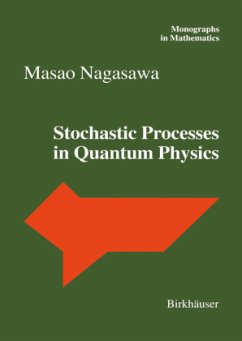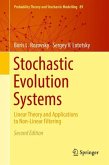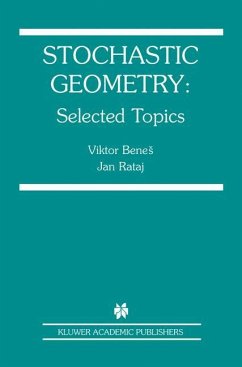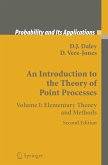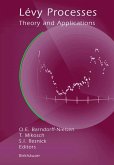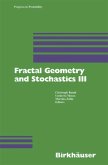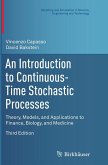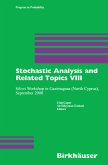Masao Nagasawa
Stochastic Processes in Quantum Physics
Masao Nagasawa
Stochastic Processes in Quantum Physics
- Broschiertes Buch
- Merkliste
- Auf die Merkliste
- Bewerten Bewerten
- Teilen
- Produkt teilen
- Produkterinnerung
- Produkterinnerung
"Stochastic Processes in Quantum Physics" addresses the question 'What is the mathematics needed for describing the movement of quantum particles', and shows that it is the theory of stochastic (in particular Markov) processes and that a relativistic quantum particle has pure-jump sample paths while sample paths of a non-relativistic quantum particle are continuous. Together with known techniques, some new stochastic methods are applied in solving the equation of motion and the equation of dynamics of relativistic quantum particles. The problem of the origin of universes is discussed as an…mehr
Andere Kunden interessierten sich auch für
![Stochastic Evolution Systems Stochastic Evolution Systems]() Boris L. RozovskyStochastic Evolution Systems77,99 €
Boris L. RozovskyStochastic Evolution Systems77,99 €![Stochastic Geometry Stochastic Geometry]() Viktor BenesStochastic Geometry39,99 €
Viktor BenesStochastic Geometry39,99 €![An Introduction to the Theory of Point Processes An Introduction to the Theory of Point Processes]() D.J. DaleyAn Introduction to the Theory of Point Processes178,99 €
D.J. DaleyAn Introduction to the Theory of Point Processes178,99 €![Lévy Processes Lévy Processes]() Lévy Processes139,99 €
Lévy Processes139,99 €![Fractal Geometry and Stochastics III Fractal Geometry and Stochastics III]() Fractal Geometry and Stochastics III77,99 €
Fractal Geometry and Stochastics III77,99 €![An Introduction to Continuous-Time Stochastic Processes An Introduction to Continuous-Time Stochastic Processes]() Vincenzo CapassoAn Introduction to Continuous-Time Stochastic Processes50,99 €
Vincenzo CapassoAn Introduction to Continuous-Time Stochastic Processes50,99 €![Stochastic Analysis and Related Topics VIII Stochastic Analysis and Related Topics VIII]() Stochastic Analysis and Related Topics VIII81,99 €
Stochastic Analysis and Related Topics VIII81,99 €-
-
-
"Stochastic Processes in Quantum Physics" addresses the question 'What is the mathematics needed for describing the movement of quantum particles', and shows that it is the theory of stochastic (in particular Markov) processes and that a relativistic quantum particle has pure-jump sample paths while sample paths of a non-relativistic quantum particle are continuous. Together with known techniques, some new stochastic methods are applied in solving the equation of motion and the equation of dynamics of relativistic quantum particles. The problem of the origin of universes is discussed as an application of the theory. The text is almost self-contained and requires only an elementary knowledge of probability theory at the graduate level, and some selected chapters can be used as (sub-)textbooks for advanced courses on stochastic processes, quantum theory and theoretical chemistry.
Produktdetails
- Produktdetails
- Monographs in Mathematics 94
- Verlag: Birkhäuser / Birkhäuser Basel / Springer, Basel
- Artikelnr. des Verlages: 978-3-0348-9543-9
- Softcover reprint of the original 1st ed. 2000
- Seitenzahl: 624
- Erscheinungstermin: 28. Oktober 2012
- Englisch
- Abmessung: 240mm x 170mm x 34mm
- Gewicht: 1043g
- ISBN-13: 9783034895439
- ISBN-10: 3034895437
- Artikelnr.: 39944446
- Herstellerkennzeichnung Die Herstellerinformationen sind derzeit nicht verfügbar.
- Monographs in Mathematics 94
- Verlag: Birkhäuser / Birkhäuser Basel / Springer, Basel
- Artikelnr. des Verlages: 978-3-0348-9543-9
- Softcover reprint of the original 1st ed. 2000
- Seitenzahl: 624
- Erscheinungstermin: 28. Oktober 2012
- Englisch
- Abmessung: 240mm x 170mm x 34mm
- Gewicht: 1043g
- ISBN-13: 9783034895439
- ISBN-10: 3034895437
- Artikelnr.: 39944446
- Herstellerkennzeichnung Die Herstellerinformationen sind derzeit nicht verfügbar.
Masao Nagasawa is professor of mathematics at the University of Zurich, Switzerland.
I Markov Processes.- 1.1 Classical Mechanics.- 1.2 Movement of a Particle with Noise.- 1.3 Transition Probability and the Markov Property.- 1.4 Diffusion Equations.- 1.5 Brownian Motions.- 1.6 The Itô formula.- Appendix. Monotone Lemmas.- II Time Reversal and Duality.- 2.1 Time Reversal of Markov Processes and Duality.- 2.2 Space-Time Markov Processes and Space-Time Duality.- 2.3 Time Reversal and Schrödinger's Representation.- III Non-Relativistic Quantum Theory.- 3.1 Non-Relativistic Equation of Motion.- 3.2 Stationary States and Eigenvalue Problem.- 3.3 Time Reversal of Diffusion Processes.- 3.4 Duality Relation of Diffusion Processes.- 3.5 Equation of Motion in General Cases.- 3.6 Principle of Superposition of Markov Processes.- 3.7 Non-Relativistic Schrödinger Equation.- 3.8 State Preparations and Measurements.- 3.9 Diffusion or Schrödinger Equations ?.- 3.10 The First Technical Convention.- IV Stationary Schrödinger Processes.- 4.1 Stationary States.- 4.2 One-Dimensional Harmonic Oscillator.- 4.3 An Example in Two-Dimension.- 4.4 Superposition of Eigenfunctions.- 4.5 Further Excited States.- 4.6 Hydrogen Atom.- V Construction of the Schrödinger Processes.- 5.1 The Feynman-Kac Formula.- 5.2 Solving the Equation of Motion.- 5.3 Transformation by Multiplicative Functionals.- 5.4 Renormalization.- 5.5 A Variational Method.- 5.6 The Maruyama-Girsanov Formula.- 5.7 A Lagrangian Formulation.- 5.8 The Second Technical Convention.- VI Markov Processes with Jumps.- 6.1 Poisson and Compound Poisson Processes.- 6.2 Poisson Random measures and Point Processes.- 6.3 Stochastic Integrals with Poisson Point Processes.- 6.4 Lévy Processes.- 6.5 Stable Processes.- 6.6 Bochner's Subordination.- 6.7 Duality of Subordinate Semi-Groups.- 6.8 Harmonic Transformation ofSubordinate Semi-Groups.- 6.9 Duality of Fractional Powers of Time-Dependent Operators.- VII Relativistic Quantum Particles.- 7.1 A Relativistic Schrödinger Equation for a Spinless Paticle.- 7.2 Equation of Motion for Relativistic Quantum Particles.- 7.3 Stationary States of the Relativistic Schrödinger Equation.- 7.4 Stochastic Processes for Relativistic Spinless Particles.- 7.5 Non-Relativistic Limit.- 7.6 A Diffusion Approximation.- VIII Stochastic Differential Equations of Pure-Jumps.- 8.1 Markov Processes with the Generators of Fractional Power.- 8.2 Stochastic Differential Equations of Pure-Jumps.- 8.3 The Case with no Potential Term.- 8.4 To Solve the Stochastic Differential Equations of Pure-Jumps.- 8.5 To Construct Pure-Jump Markov Processes.- 8.6 A Remark on the Integrability Condition.- IX Variational Principle for Relativistic Quantum Particles.- 9.1 Absolute Continuity.- 9.2 Pure-Jump Markov Processes.- 9.3 A Multiplicative Functional.- 9.4 Renormalization and Variational Principle.- X Time Dependent Subordination and Markov Processes with Jumps.- 10.1 Time-Inhomogeneous Subordination.- 10.2 Lemmas.- 10.3 Stochastic Differential Equation with Jumps.- 10.4 A Formula of Feynman-Kac Type.- 10.5 Markov Processes with Jumps.- Appendix. Integration by Parts Formulae.- XI Concave Majorants of Lévy Processes and the Light Cone.- 14.1 The Vertex Process of a Lévy Process.- 14.2 Propositions on Random walks.- 14.3 Proof of Propositions on Random Walks.- 14.4 Proof of the main Theorems.- 14.5 Examples.- 14.6 The light Cone.- XII The Locality in Quantum Physics.- 12.1 Historical Overview.- 12.2 Hidden-Variable Theories.- 12.3 Locality of Hidden-Variable Theories.- 12.4 Spin-Correlation of Three Particles.- 12.5 Gudder's Hidden-Variable Theory.- 12.6Spin-Correlations in Gudder's Theory.- 12.7 Some Remarks.- XIII Micro Statistical Theory.- 13.1 The Source of the Noise.- 13.2 Large Deviations of the Renormalized Processes.- 13.3 The Propagation of Chaos.- 13.4 Micro Statistical Mechanics.- 13.5 Propagation of Chaos of Pure-Jump Processes.- 13.6 Superposition of Movements.- 12.7 A Remark on the Gibbs Distribution.- XIV Processes on Open Time Intervals.- 14.1 Diffusion Processes on Open Time Intervals.- 14.2 Time-Reversed Schrödinger Processes.- 14.3 A Theorem of Jeulin-Yor.- 14.4 Reflecting Brownian Motion.- 14.5 Two-Sided Skorokhod Type Problem.- 14.6 Skorokhod Problem with Singular Drift.- 14.7 The Minimum and Maximum Solutions.- 14.8 The Uniqueness and Non-Uniqueness of Solutions.- 14.9 An Application: The Origin of Universes.- XV Creation and Killing of Particles.- 15.1 Non-Linear Differential Equations.- 15.2 Branching Markov Processes.- 15.3 The Expected Number of Particles.- 15.4 Killing.- XVI The ltô Calculus.- 16.1 The Itô Integral.- 16.2 Martingales.- 16.3 The Itô Integral with Local Martingales.- 16.4 Itô's formula.- 16.5 Stochastic Differential Equations.- 16.6 Stochastic Differential Calculus.- References.
I Markov Processes.- 1.1 Classical Mechanics.- 1.2 Movement of a Particle with Noise.- 1.3 Transition Probability and the Markov Property.- 1.4 Diffusion Equations.- 1.5 Brownian Motions.- 1.6 The Itô formula.- Appendix. Monotone Lemmas.- II Time Reversal and Duality.- 2.1 Time Reversal of Markov Processes and Duality.- 2.2 Space-Time Markov Processes and Space-Time Duality.- 2.3 Time Reversal and Schrödinger's Representation.- III Non-Relativistic Quantum Theory.- 3.1 Non-Relativistic Equation of Motion.- 3.2 Stationary States and Eigenvalue Problem.- 3.3 Time Reversal of Diffusion Processes.- 3.4 Duality Relation of Diffusion Processes.- 3.5 Equation of Motion in General Cases.- 3.6 Principle of Superposition of Markov Processes.- 3.7 Non-Relativistic Schrödinger Equation.- 3.8 State Preparations and Measurements.- 3.9 Diffusion or Schrödinger Equations ?.- 3.10 The First Technical Convention.- IV Stationary Schrödinger Processes.- 4.1 Stationary States.- 4.2 One-Dimensional Harmonic Oscillator.- 4.3 An Example in Two-Dimension.- 4.4 Superposition of Eigenfunctions.- 4.5 Further Excited States.- 4.6 Hydrogen Atom.- V Construction of the Schrödinger Processes.- 5.1 The Feynman-Kac Formula.- 5.2 Solving the Equation of Motion.- 5.3 Transformation by Multiplicative Functionals.- 5.4 Renormalization.- 5.5 A Variational Method.- 5.6 The Maruyama-Girsanov Formula.- 5.7 A Lagrangian Formulation.- 5.8 The Second Technical Convention.- VI Markov Processes with Jumps.- 6.1 Poisson and Compound Poisson Processes.- 6.2 Poisson Random measures and Point Processes.- 6.3 Stochastic Integrals with Poisson Point Processes.- 6.4 Lévy Processes.- 6.5 Stable Processes.- 6.6 Bochner's Subordination.- 6.7 Duality of Subordinate Semi-Groups.- 6.8 Harmonic Transformation ofSubordinate Semi-Groups.- 6.9 Duality of Fractional Powers of Time-Dependent Operators.- VII Relativistic Quantum Particles.- 7.1 A Relativistic Schrödinger Equation for a Spinless Paticle.- 7.2 Equation of Motion for Relativistic Quantum Particles.- 7.3 Stationary States of the Relativistic Schrödinger Equation.- 7.4 Stochastic Processes for Relativistic Spinless Particles.- 7.5 Non-Relativistic Limit.- 7.6 A Diffusion Approximation.- VIII Stochastic Differential Equations of Pure-Jumps.- 8.1 Markov Processes with the Generators of Fractional Power.- 8.2 Stochastic Differential Equations of Pure-Jumps.- 8.3 The Case with no Potential Term.- 8.4 To Solve the Stochastic Differential Equations of Pure-Jumps.- 8.5 To Construct Pure-Jump Markov Processes.- 8.6 A Remark on the Integrability Condition.- IX Variational Principle for Relativistic Quantum Particles.- 9.1 Absolute Continuity.- 9.2 Pure-Jump Markov Processes.- 9.3 A Multiplicative Functional.- 9.4 Renormalization and Variational Principle.- X Time Dependent Subordination and Markov Processes with Jumps.- 10.1 Time-Inhomogeneous Subordination.- 10.2 Lemmas.- 10.3 Stochastic Differential Equation with Jumps.- 10.4 A Formula of Feynman-Kac Type.- 10.5 Markov Processes with Jumps.- Appendix. Integration by Parts Formulae.- XI Concave Majorants of Lévy Processes and the Light Cone.- 14.1 The Vertex Process of a Lévy Process.- 14.2 Propositions on Random walks.- 14.3 Proof of Propositions on Random Walks.- 14.4 Proof of the main Theorems.- 14.5 Examples.- 14.6 The light Cone.- XII The Locality in Quantum Physics.- 12.1 Historical Overview.- 12.2 Hidden-Variable Theories.- 12.3 Locality of Hidden-Variable Theories.- 12.4 Spin-Correlation of Three Particles.- 12.5 Gudder's Hidden-Variable Theory.- 12.6Spin-Correlations in Gudder's Theory.- 12.7 Some Remarks.- XIII Micro Statistical Theory.- 13.1 The Source of the Noise.- 13.2 Large Deviations of the Renormalized Processes.- 13.3 The Propagation of Chaos.- 13.4 Micro Statistical Mechanics.- 13.5 Propagation of Chaos of Pure-Jump Processes.- 13.6 Superposition of Movements.- 12.7 A Remark on the Gibbs Distribution.- XIV Processes on Open Time Intervals.- 14.1 Diffusion Processes on Open Time Intervals.- 14.2 Time-Reversed Schrödinger Processes.- 14.3 A Theorem of Jeulin-Yor.- 14.4 Reflecting Brownian Motion.- 14.5 Two-Sided Skorokhod Type Problem.- 14.6 Skorokhod Problem with Singular Drift.- 14.7 The Minimum and Maximum Solutions.- 14.8 The Uniqueness and Non-Uniqueness of Solutions.- 14.9 An Application: The Origin of Universes.- XV Creation and Killing of Particles.- 15.1 Non-Linear Differential Equations.- 15.2 Branching Markov Processes.- 15.3 The Expected Number of Particles.- 15.4 Killing.- XVI The ltô Calculus.- 16.1 The Itô Integral.- 16.2 Martingales.- 16.3 The Itô Integral with Local Martingales.- 16.4 Itô's formula.- 16.5 Stochastic Differential Equations.- 16.6 Stochastic Differential Calculus.- References.
"...the text is almost self-contained and requires only an elementary knowledge of probability theory at the graduate level. The book under review is recommended to mathematicians, physicists and graduate students interested in mathematical physics and stochastic processes. Furthermore, some selected chapters can be used as sub-textbooks for advanced courses on stochastic processes, quantum theory and quantum chemistry."
-ZAA
-ZAA

